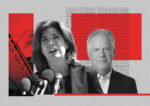The city’s hotel industry, hotel workers union and City Council member Julie Menin reached a compromise Wednesday on a bill that hotel operators had fiercely opposed. The deal clears the way for its passage.
Citing revisions to the Safe Hotels Act, the Hotel Association of New York City dropped its opposition to the measure, which would require hotel operators to obtain a license.
The legislation, which initially called for hotels to directly employ all of their core staff, now makes exceptions for engineers and others with “highly technical skills,” including employees focused on security, laundry, valet parking, making reservations and other tasks.
That addresses the industry’s major concern with the original bill: that it would effectively prevent hotels from hiring subcontractors.
The revised bill also allows licenses to be transferred and makes clear that in cases of service disruptions — such as an employee not showing up to cover the front desk — the hotel’s license can’t be revoked. The measure also excludes real estate investment trusts.
In a statement, HANYC president and CEO Vijay Dandapani said the amended bill addresses the group’s “most serious concerns.”
Menin said she was pleased by the agreement.
“We listened to stakeholders, prioritized their feedback, and now look forward to a hearing on this vital legislation which protects hotel guests, workers, and the broader community,” she said in a statement. A hearing is scheduled for Oct. 9.
Menin’s initial bill faced swift backlash from hotel operators, who said the measure — billed as an effort to target unsafe and unsanitary conditions at some city hotels — was actually a way to boost union hotels.
Nonunion hotels, rendered unable to hire subcontractors and facing other new costs, would likely have had to raise their prices, eroding their cost advantage. The city’s powerful hotel union, which championed the original measure, supports the latest version.
“With some modest modifications, we now have a better bill that will achieve its intended goals of protecting hotel workers, guests, and neighbors, while also promoting a thriving hotel sector in New York City,” Rich Maroko, president of the New York Hotel & Gaming Trades Council, said in a statement.
This week, the American Hotel & Lodging Association revealed that it had drafted its own version of Menin’s bill. The national trade group’s version eliminated all the “core staff” provisions. But the group was not part of the negotiations between Menin and the Hotel Association of New York City and does not support the bill, although that is not likely to affect the outcome.
“The new version of the legislation still contains language that will cause significant economic harm, primarily to small, family-owned hotels and the largely immigrant and minority-owned businesses that support them,” said Kevin Carey, interim president and CEO of the American Hotel & Lodging Association. “There is no question that this bill, if passed, will cause many of New York City’s small businesses to close.”
Elizabeth Cryan contributed reporting.
Read more


